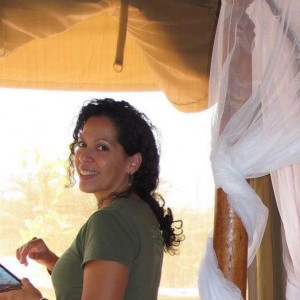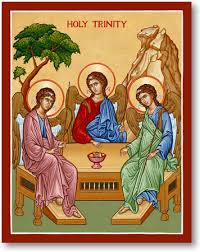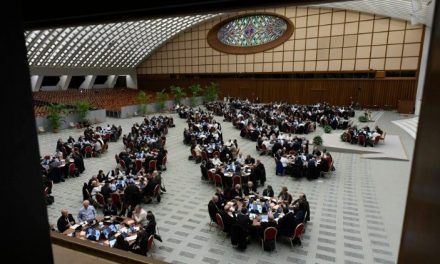This latest post in the series on the Faith of Theologians comes from guest contributor MT Dávila, a Roman Catholic laywoman. MT lives in Malden, MA, with husband Rob and 4 children, and in her spare time she teaches Christian ethics at Andover Newton Theological School. Her current project asks lay faithful how they relate activism and public witness to discipleship.
A United Methodist respecting Roman authority?
My faith is lived in a home where a kaleidoscope of religious traditions and experiences open windows, change the curtains, rearrange the furniture, build additions, invent new recipes in the kitchen, and switch up the lighting fixtures in the house that is my Roman Catholic tradition.
Born and raised in a Roman Catholic Puerto Rican family, my parents gave me the most precious gift of the empowering Catholicism embodied in the Cursillos movement. Focused in a strong laity grounded in the empowering grace of life in the sacraments, Cursillos put before me a host of lay adults who lived fallen human lives in the embrace of and trust in the God that self communicates in love and power through the sacraments and prayer. To this day the faith life and discipleship of the laity is central to my own experiences and my interests as a theologian and an ethicist. How do we let God in to our everyday? How are we to move through both the pain and the joys of being human in this world while in the realm of being “the people in the pews”?
A Unitarian Universalist with a really high Christology?
A Lutheran with a devotion to the Eucharist?
The Catholic faith in its most common expressions, and often misunderstood and oversimplified theology in the media, has always felt two sizes too small. I’ve never felt just Roman Catholic, and am most spiritually alive in religiously diverse settings. This was always evident, especially in my curiosity early in life as to the religious practices of my friends who were not Catholic, but it became crystal clear during my Master of Theological Studies degree at Boston University School of Theology, affiliated with the United Methodist Church.
The richness of the Christian traditions present invited me to explore Christian theology in many different colors and flavors, but, most importantly, to look at basic elements of my faith through a sharper and yet more flexible lens. My Catholic faith deepened as I began to understand it within the context of the interconnectedness among different faith traditions. Perhaps the most illustrative experience of these years was when I heard UMC Bishop Leontine Kelly, an African-American woman, speak about being invited to a Catholic convent to celebrate the Eucharist, because the nuns wanted to receive communion from a female celebrant.
It was at this time that I came across the preferential option for the poor, not as a uniquely Catholic principle, but as a gift from Christianity to the world, one that bears close resemblance with other world traditions’ understanding of human being and becoming judged in light of the treatment of the most vulnerable members of society. The perennial question of the life of faith of the laity now required an answer that expressed the heteronomous complexity of the religious life of every human being, especially the poor and oppressed, within the web of diverse religious expressions and multiple belongings, rather than the narrow conviction that we live in and belong to some strictly monolithic faith tradition.
A Pentecostal with an overly developed sacramental theology?
A Jew for Christ?
God’s graces have me teaching at Andover Newton Theological School, an interdenominational, multi-faith setting where I can extensively flex the preaching muscles I’ve been given, and where I can present a much more deeply and richly complex face of Catholicism to a variety of students than what they are used to seeing represented in popular media. I am no longer taken aback by comments such as “this is not the Roman Catholicism of my youth!” that I frequently hear from my students in the United Church of Christ or from the UUA movement. At the same time, I am in a setting where I can take marriage equality and LGBTQ rights as a holy given, participate in Jewish holy days with my covenanted neighbors at Hebrew College, and I can mobilize for public action with Muslim, Jewish, and Christian leaders through the Interreligious Center for Public Life.
At the same time, working in an ecumenical and multi-faith setting has afforded me the opportunity to share two elements that I consider most central to my faith in new, yet challenging ways. Students from all backgrounds appreciate my focus on a consistent ethic of life, with all it entails – helping them to see the Catholic faith in a much more holistic, comprehensive and deep way than what they commonly understand as the “pro-life” stance. Second, I share with them the option for the poor, and my faith in a Divine that, beyond choosing to be born among us, chooses to die with us, to suffer unjust human death as the deepest expression of solidarity and love.
From the United Church of Christ with an episcopal hang-up?
As a consequence of my experiences in the past 20+ years, I cannot conceive of my Catholicism apart of or in isolation from other religious traditions. I can no more identify being Roman Catholic with St. Peter’s Basilica in Rome without also including the vision of the tents set out by Hebrew College and Andover Newton students during the Jewish festival of booths/Sukkot. While I will forever hold a fervent devotion to the presence of Christ in the Eucharist, this is now enriched by the invitation to become aware of the holy in the Muslim call to prayer. And sometimes my hermanas Evangélicas are the clearest and most real witnesses of the Communion of Saints I can conjure.
Perhaps some might find this disturbingly outside the confines of the Roman Catholic faith. But I believe the life of faith is best lived unconfined, in the interspaces of the sacred, rearranging the furniture in our holy houses before we get too comfortable with the way things are. I most deeply feel this when I consider some of the hardest ethical questions discussed here at CMT, such as human trafficking and immigration, the ecological crisis, human rights, and the dire, unjust, and violent poverty of so many. At the level of ethical considerations I believe that multi-faith engagement is not an option, but rather a necessary exercise of the human spirit in search for answers to our brokenness and the hurt we do to each other. To this I humbly bring a Catholicism that, while beginning two-sizes too small, is perennially thirsty for the rearranging of furniture, expansions, new recipes, and the demoing and remodeling headaches afforded by conversations with others’ experiences of the sacred.
A Roman Catholic?
Insha’Allah. God willing.





My dad was Jewish, but upon meeting my mother, he became ardent about the faith. Regrettably, a twice divorced Jew wanting to become Catholic in the late 50’s was not even a topic for discussion. This did nothing to tamp down his fervor, and he was the driving force of our life in the parish – not my faithful, but marginal Catholic-born mother.
As someone with this background, and someone who has always had a deeply ecumenical heart, I read your post with great joy. It is worth noting that I had asked our mutual friend in Boston a bit about you when I saw her on Monday, so great is my curiosity MT! So reading this is a real treat, to hear your own words.
Thank you for the gift of this post and I am so grateful to CMT for this series of posts.
Peace, Salaam, Shalom, Paz, Paix, εἰρήνη, ης, ἡ!
MT, thank you so much for sharing you faith journey. So beautifully written! I love the metaphor of rearranging the furniture. Your work inspires me!
Thanks Dana for a wonderful and very inspiring post ! Loved your broad, ecumenical and interfaith Catholicism.
Insha’Allah.
God Bless
Chris, just to be clear: this was a guest post from MT Davila; it is not my story. But I also appreciated her articulation of Catholicism in such breadth. A large part of why I wanted to do this series is exactly to hear from people whose experience (of faith, of the Church, of what it means to be a theologian) is different than my own, and to value those stories for what they reveal about the diverse beauty of the Church and of the theological guild.